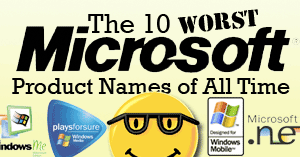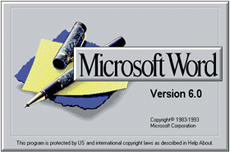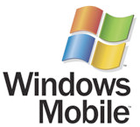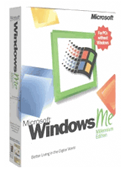 [NOTE: I wrote this piece for my pals at PC World, who kindly agreed to let me publish it here, too.]
[NOTE: I wrote this piece for my pals at PC World, who kindly agreed to let me publish it here, too.]
If Microsoft had invented the iPod, it would have been called the Microsoft I-pod Pro 2005 Human Ear Professional Edition. The cult-hit video that makes that assertion may have been a joke, but it rings true. And when word emerged that the video was a self-parody produced within Microsoft, the point was even clearer: The world’s largest software developer just isn’t very good at naming stuff.
Some Microsoft names sound clunky; some are confusing; some are undignified or overambitious. More than any other company in technology, the behemoth of Redmond loves to change product names–often replacing one lackluster label with an equally uninspired one. Microsoft has also been known to mess up some names that are actually perfectly good, such as Windows and Word, by needlessly tampering with them.
Herewith, in chronological order, are ten Microsoft names that could have been a lot better, together with some semiconstructive advice on monikers that would have more euphonious and/or more accurate. I also selected six not-quite-as-bad runners-up.
 1993: Word 6.0 for Windows: When Microsoft upgraded 1991’s popular Word 2.0 for Windows, it replaced it with…no, not something logical like Word 3.0. Rather, it blithely hopscotched over three version numbers and landed at Word 6.0. The official explanation for the skippage was that it brought the Windows edition’s version number into line with that of the older DOS incarnation of Word. But conspiracy theorists noted that it also allowed Word to catch up with archrival WordPerfect, which also released a version 6.0 in 1993.
1993: Word 6.0 for Windows: When Microsoft upgraded 1991’s popular Word 2.0 for Windows, it replaced it with…no, not something logical like Word 3.0. Rather, it blithely hopscotched over three version numbers and landed at Word 6.0. The official explanation for the skippage was that it brought the Windows edition’s version number into line with that of the older DOS incarnation of Word. But conspiracy theorists noted that it also allowed Word to catch up with archrival WordPerfect, which also released a version 6.0 in 1993.
Whatever the rationale, the move rendered the practical purpose of version numbers meaningless, thereby setting a bad example for other companies such as Netscape, which later went straight from Netscape Navigator 4.0 to version 6.0.
What it should have been called: Word 3.0 for Windows. Simple and accurate.
 1995: Microsoft Bob. When I asked my Twitter and Facebook pals to nominate bad Microsoft names, this legendarily lousy Windows front-end hosted by animated characters came up far more often than any other product. It’s possible that the badness of the product has tarnished its title. But as several people pointed out, “Microsoft Bob” is both cutesy-cute and uninformative–it doesn’t give you an inkling as to what the product is all about. (The box featured a smiley face wearing Bill Gates-like nerdy glasses, but the main character in the interface was a dog named Rover, who was later revived for Windows XP’s misbegotten search feature.)
1995: Microsoft Bob. When I asked my Twitter and Facebook pals to nominate bad Microsoft names, this legendarily lousy Windows front-end hosted by animated characters came up far more often than any other product. It’s possible that the badness of the product has tarnished its title. But as several people pointed out, “Microsoft Bob” is both cutesy-cute and uninformative–it doesn’t give you an inkling as to what the product is all about. (The box featured a smiley face wearing Bill Gates-like nerdy glasses, but the main character in the interface was a dog named Rover, who was later revived for Windows XP’s misbegotten search feature.)
What it should have been called: Well, Microsoft Rover would have been at least slightly more descriptive–especially since the product itself was such a dog.
 1996-present: Every name ever associated with handheld devices running Microsoft software. At first, they were called Handheld PCs, and ran an OS known as Windows CE. Then they morphed into Palm PCs–until the PalmPilot people complained, whereupon they became Palm-Size PCs. But only briefly: Soon, Microsoft wanted us to call them Pocket PCs, and the software they ran was renamed Windows Mobile.
1996-present: Every name ever associated with handheld devices running Microsoft software. At first, they were called Handheld PCs, and ran an OS known as Windows CE. Then they morphed into Palm PCs–until the PalmPilot people complained, whereupon they became Palm-Size PCs. But only briefly: Soon, Microsoft wanted us to call them Pocket PCs, and the software they ran was renamed Windows Mobile.
That name stuck around when the OS migrated from PDAs to phones, although it bifurcated into two editions: Windows Mobile Pocket PC and Windows Mobile Smartphone. Then Microsoft declared that there were three Windows Mobile variants–Windows Mobile Classic, Windows Mobile Professional, and Windows Mobile Standard. As for the devices themselves, Steve Ballmer declared in February of this year that they’d be known henceforth as Windows Phones–scratch the “Mobile.” Except for the fact that the OS is still Windows Mobile. Got that?What they should have been called: Melvin. Or just about anything else, really, as long as it didn’t keep changing.
 2000: .NET. In the mid-1990s, critics accused Microsoft was accused by many of being slow to jump on the Internet bandwagon. By the dawn of the new millennium, however, it was firmly on board–and in June 2000, it unveiled a vision for online services it called .NET. As originally articulated, .NET addressed consumers, businesses, and developers, and it involved everything from programming languages to an online version of Microsoft Office to calendaring and communications services to a small-business portal to stuff for PDAs, cell phones, and gaming consoles. It was so wildly ambitious, so all-encompassing, and so buzzword-laden that it pretty much defied comprehension, at least if you weren’t a professional geek. Which the company seemed to realize–it quickly stopped pushing the concept to consumers, instead restricting it to programming tools.
2000: .NET. In the mid-1990s, critics accused Microsoft was accused by many of being slow to jump on the Internet bandwagon. By the dawn of the new millennium, however, it was firmly on board–and in June 2000, it unveiled a vision for online services it called .NET. As originally articulated, .NET addressed consumers, businesses, and developers, and it involved everything from programming languages to an online version of Microsoft Office to calendaring and communications services to a small-business portal to stuff for PDAs, cell phones, and gaming consoles. It was so wildly ambitious, so all-encompassing, and so buzzword-laden that it pretty much defied comprehension, at least if you weren’t a professional geek. Which the company seemed to realize–it quickly stopped pushing the concept to consumers, instead restricting it to programming tools.
What it should have been called: How about “Virtually Everything Microsoft Does Involving the Internet From This Day Forward,” or VEMDIFTDF for short? Or what if Microsoft had simply declared that it was now Web-centric, period–no new branding required?
 2000: Windows Millennium Edition. Microsoft couldn’t call this successor to Windows 98 “Windows 2000” because it had already assigned that name to Windows NT’s replacement. So the company saddled the OS with a name that was both pretentious and goofy, and gave it the overly adorable (and badly capitalized) nickname “Windows Me.” It was probably bad juju: The product itself went on to be widely reviled as slow, glitchy, and insubstantial; and to this day its name rivals that of Microsoft Bob as shorthand for “crummy software.”
2000: Windows Millennium Edition. Microsoft couldn’t call this successor to Windows 98 “Windows 2000” because it had already assigned that name to Windows NT’s replacement. So the company saddled the OS with a name that was both pretentious and goofy, and gave it the overly adorable (and badly capitalized) nickname “Windows Me.” It was probably bad juju: The product itself went on to be widely reviled as slow, glitchy, and insubstantial; and to this day its name rivals that of Microsoft Bob as shorthand for “crummy software.”
What it should have been called: Windows 2001, especially if Microsoft marketing had assembled an ad campaign involving HAL 9000 and/or apes hurling things at an obelisk. Bonus virtue: That name would have given Microsoft an excuse to delay the OS for six months to fix bugs.
 When OnLive revealed its plans last week for a streaming computer game service, it was hard to pick out the criticism with all the buzz in the air. Admittedly, I didn’t bother to question the service’s technical feasibility (I’m still fixated on whether OnLive can really compete on pricing), but now that the dust has settled, there’s plenty of skepticism to go around.
When OnLive revealed its plans last week for a streaming computer game service, it was hard to pick out the criticism with all the buzz in the air. Admittedly, I didn’t bother to question the service’s technical feasibility (I’m still fixated on whether OnLive can really compete on pricing), but now that the dust has settled, there’s plenty of skepticism to go around.

 Announced at the
Announced at the  [NOTE: I wrote this piece for my pals at
[NOTE: I wrote this piece for my pals at  1993: Word 6.0 for Windows: When Microsoft upgraded 1991’s popular Word 2.0 for Windows, it replaced it with…no, not something logical like Word 3.0. Rather, it blithely hopscotched over three version numbers and landed at Word 6.0. The official explanation for the skippage was that it brought the Windows edition’s version number into line with that of the older DOS incarnation of Word. But conspiracy theorists noted that it also allowed Word to catch up with archrival WordPerfect, which also released a version 6.0 in 1993.
1993: Word 6.0 for Windows: When Microsoft upgraded 1991’s popular Word 2.0 for Windows, it replaced it with…no, not something logical like Word 3.0. Rather, it blithely hopscotched over three version numbers and landed at Word 6.0. The official explanation for the skippage was that it brought the Windows edition’s version number into line with that of the older DOS incarnation of Word. But conspiracy theorists noted that it also allowed Word to catch up with archrival WordPerfect, which also released a version 6.0 in 1993. 1995: Microsoft Bob. When I asked my Twitter and Facebook pals to nominate bad Microsoft names, this
1995: Microsoft Bob. When I asked my Twitter and Facebook pals to nominate bad Microsoft names, this  1996-present: Every name ever associated with handheld devices running Microsoft software. At first, they were called
1996-present: Every name ever associated with handheld devices running Microsoft software. At first, they were called  2000: .NET. In the mid-1990s, critics accused Microsoft was accused by many of being slow to jump on the Internet bandwagon. By the dawn of the new millennium, however, it was firmly on board–and in June 2000, it unveiled a
2000: .NET. In the mid-1990s, critics accused Microsoft was accused by many of being slow to jump on the Internet bandwagon. By the dawn of the new millennium, however, it was firmly on board–and in June 2000, it unveiled a  2000: Windows Millennium Edition. Microsoft couldn’t call
2000: Windows Millennium Edition. Microsoft couldn’t call  Okay. I know its not professional to say it, but I’m going to. Why must this company try so damn hard to make life difficult for the people who want to use their content? Oh that’s right.
Okay. I know its not professional to say it, but I’m going to. Why must this company try so damn hard to make life difficult for the people who want to use their content? Oh that’s right.  What do you do after everybody in the country has already signed up for a two-year contract to get a cheap cell phone? Looks like AT&T thinks that signing them up for a two-year contract to get a cheap netbook might be the next step. The company has
What do you do after everybody in the country has already signed up for a two-year contract to get a cheap cell phone? Looks like AT&T thinks that signing them up for a two-year contract to get a cheap netbook might be the next step. The company has  I’m in Las Vegas at the
I’m in Las Vegas at the  We recently gave Sony
We recently gave Sony